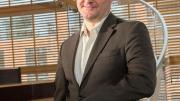Dustin Tingley is less interested in political personalities than in the mechanisms that animate politics. His new book, Sailing the Water’s Edge, is a deep, quantitative dive into how the structure of American government influences U.S. relationships with other countries. That isn’t to say he’s uninterested in the here-and-now impact of his work: “There are presidential candidates who imply they’re willing to carpet-bomb vast portions of the world,” he says gravely. He sees engaging with the public as a mandate of his role. Tingley has studied everything from climate change to olfactory cues in mating to negotiations between young children, his disparate interests unified by his “obsession” with data, statistics, and disentangling cause and effect. “There are politics on the playground,” he says, “and there are politics in the forums of the United Nations.” Named a professor of government last fall, he contributes his empirical instincts elsewhere, too, leading the University’s outcomes-based research for HarvardX on the science of learning. Between college at the University of Rochester and a Ph.D. from Princeton, Tingley taught high-school math and history, unsure if he would become a career academic. There were times when he wanted to be an environmental advocate, he remembers, or a music producer. But did he have any doubts about his path while in graduate school? “Very few,” he answers. These days, between his work and family (he has a two-year-old son), Tingley has less time for the guitar, an old passion. He’s played in a mix of bands—rock, jazz, experimental—but has never taken to formal lessons. “They always wanted me to read music,” he jokes, “and I didn’t really want to.”
Harvard Portrait: Dustin Tingley
Harvard Portrait: Dustin Tingley
Political scientist Dustin Tingley studies the politics of everyday life.

Dustin Tingley Photograph by Jim Harrison
You might also like
Former Homeland Security Chief Says ICE and CBP Have “Lost Their Way”
At Kennedy School talk, Jeh Johnson advocates restructuring “outdated” DHS.
Open Book: A New Nuclear Age
Harvard historian Serhii Plokhy’s latest book looks at the rising danger of a new arms race.
Harvard Symposium Tackles 400 Years of Homelessness in America
Professors explore the history of homelessness in the U.S., from colonial poor laws to today’s housing crisis
Most popular
Explore More From Current Issue

What Bonobos Teach Us About Female Power and Cooperation
A Harvard scientist expands our understanding of our closest living relatives.







